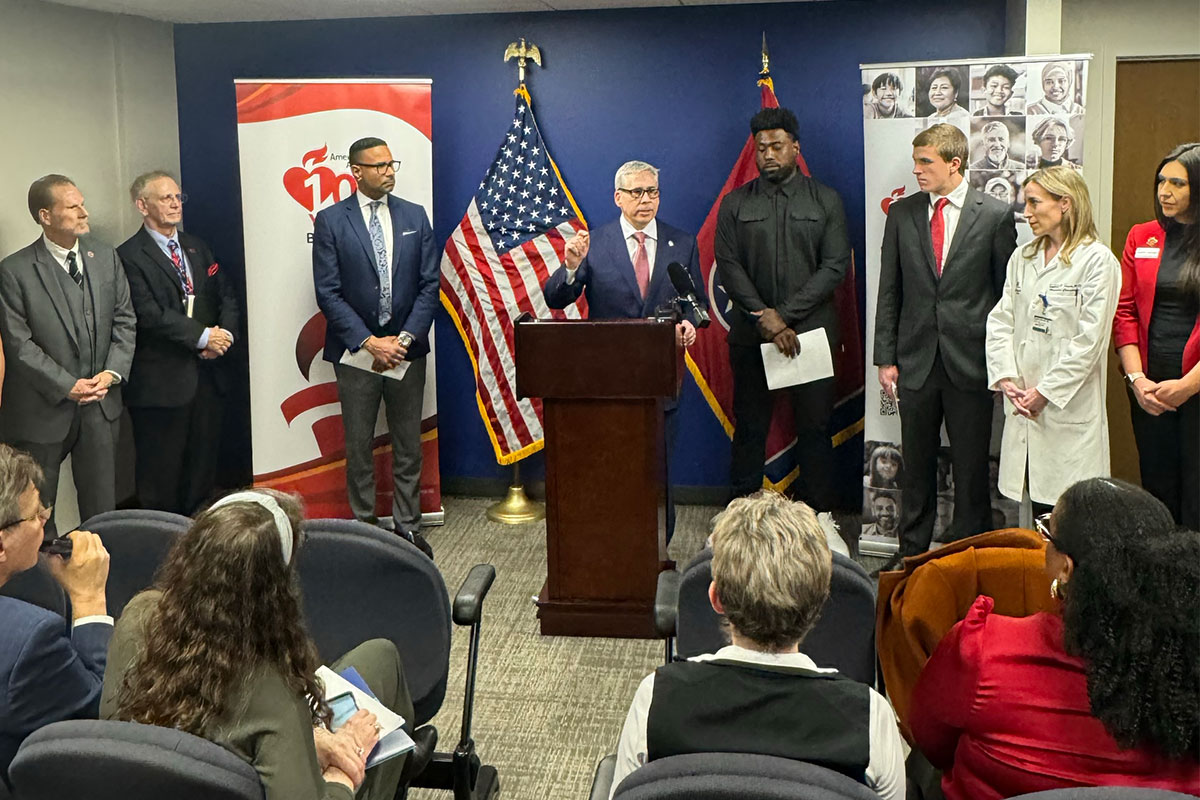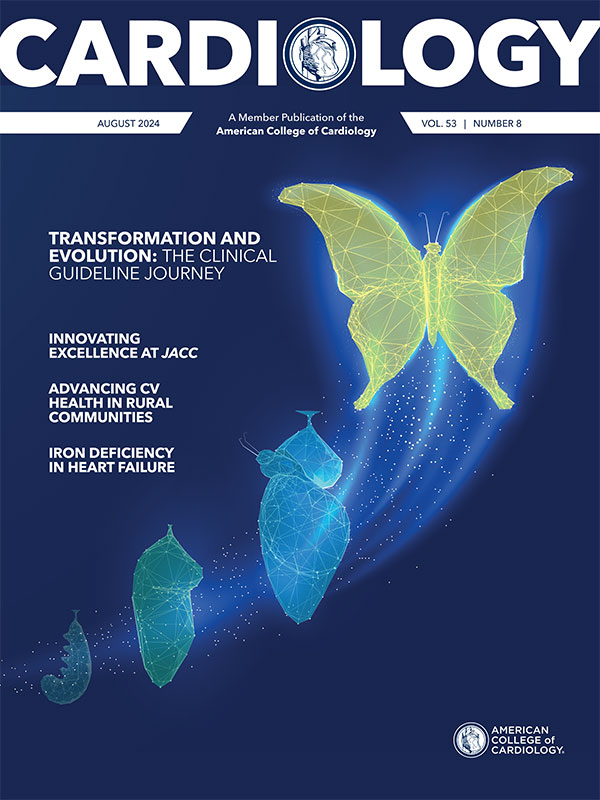Heart of Health Policy | From SCA Awareness to Noncompetes: A 2024 State Advocacy Roundup

ACC State Chapters, in partnership with ACC's State Government Affairs Team, have been hard at work pushing for legislative solutions to protect and support cardiovascular patients and clinicians, and cultivating opportunities to collaborate with like-minded stakeholders such as state medical societies, the American Heart Association and other patient advocacy groups to foster meaningful progress. A compilation of this year's victories and ongoing efforts is featured here.
2024 Grassroots Highlights:
- 25 ACC Action Alerts Launched
- 11 First-Ever State Action Alerts
- 1,623 Letters/Testimonies Submitted
- 129 Meetings With Lawmakers Held
- 9 Lobby Days Hosted
ACC Grassroots at Work
ACC State Chapters are the key to the College's state advocacy victories. This year, Chapters have hosted lobby days, met with lawmakers, testified at committee hearings, sent thousands of messages through ACC Action Alerts, and signed onto numerous letters in support of policies to improve heart health for all. Most notably, Chapters of all sizes have seen unprecedented growth in their state grassroots activities throughout 2024.
Progress on SCA Awareness and Preparedness





ACC State Chapters have continued to prioritize work associated with the National Football League's Smart Heart Sports Coalition, advocating for all 50 states to adopt evidence-based policies to prevent fatal outcomes from exercise-related sudden cardiac arrest (SCA) experienced by high school students.
The three fundamental policies backed by the coalition include: 1) access to an AED (at or within one to three minutes of the athletic venue); 2) an emergency action plan enacted and rehearsed in accordance with national standards and updated annually; and 3) CPR and AED training for coaches.
ACC Chapters have played a pivotal role in passing comprehensive legislation in five states this year with several bills still pending.
- Tennessee's Smart Heart Act: ACC's Tennessee Chapter engaged with over a dozen state lawmakers and Tennessee Gov. Bill Lee to pass comprehensive SCA legislation. Samuel O. Jones IV, MD, MPH, FACC, also spoke at a Smart Heart Sports Coalition press conference urging the Tennessee General Assembly to save lives by expanding AED access and requiring cardiac emergency response plans in schools. In May, Furrukh S. Malik, MBBS, FACC, governor-elect for ACC's Tennessee Chapter, attended a formal bill-signing ceremony highlighting the enactment of the Tennessee Smart Heart Act.
- Georgia's Win From Start to Finish: ACC's Georgia Chapter spearheaded legislation to establish SCA emergency response plans and require AEDs in all public schools K-12. They identified a bill sponsor, drafted the legislation, testified in hearings, met with lawmakers and engaged the press to get this lifesaving legislation over the finish line. Chapter leaders Arthur Reitman, MD, FACC, and J. Jeffrey Marshall, MD, FACC, were present to see Georgia Gov. Brian Kemp sign the bill into law. Jonathan H. Kim, MD, MSc, FACC, chair of ACC's Sports and Exercise Cardiology Section and member of the Chapter's leadership council, also played a critical role in advocating for the bill throughout the legislative session, testifying before the Georgia General Assembly's House Health Committee and speaking at press conferences to rally support for the bill's provisions.
- Additional State Action: Several other ACC State Chapters made SCA preparedness a legislative priority for the 2024 legislative session. Chapters in Arizona, California, Florida, Hawaii, Louisiana, Michigan, New Hampshire, Ohio, Pennsylvania, Vermont, Virigina and Wisconsin supported legislation that aligned with the Smart Heart Sports Coalition's goals. Most recently, Michigan Gov. Gretchen Whitmer signed legislation into law to expand AED access in schools after the ACC's Michigan Chapter launched a grassroots action alert campaign in support of the bill.
The Latest on Noncompetes and Restrictive Covenants
Noncompete and restrictive covenant legislation became prevalent in several state legislatures in 2024. As noncompetes have been shown to have significant impacts on many cardiovascular clinicians, several ACC State Chapters – including Florida, Oregon, Pennsylvania, Virginia and others – focused their advocacy efforts on banning noncompete agreements for health care professionals. State advocacy highlights on this topic include:
- Noncompete Victory in Maryland: ACC's Maryland Chapter won a long, hard-fought battle with the recent passage of H.B. 1388, a bill that outlaws noncompete clauses in employment agreements for Maryland physicians with compensation below $300K and specifies that noncompetes for physicians with compensation over $300K cannot restrict subsequent employment beyond one year or 10 miles. Chapter leaders, including Sammy Zakaria, MD, FACC; Joseph E. Marine, MD, MBA, FACC; and Stephen H. Pollock, MD, FACC, worked closely with the Maryland State Medical Society to usher in this advocacy success. Gov. Wes Moore signed the bill into law in late April.
- Pushing For Reform in New York: ACC's New York Chapter is advocating for legislation to eliminate or significantly modify noncompete agreements for physicians and other health care workers. In December 2023, Gov. Kathy Hochul vetoed noncompete reform legislation. The Chapter is now working with Sen. Sean Ryan to draft and negotiate a new bill for the legislature to consider after the upcoming election. Aaron Kithcart, MD, PhD, FACC, the chair of the Chapter's advocacy committee, and Srihari S. Naidu, MD, FACC, former Chapter president, led the grassroots effort to engage members and educate lawmakers, and this action is being noticed. The governor's office has told the bill sponsor that the grassroots response from cardiology was the largest ever seen from a single organization. The Chapter plans to continue this effort in 2025.
- Looking Ahead: The issue of noncompete agreements continues to be a priority for ACC Chapters, and the ACC Advocacy team anticipates more state legislatures to introduce legislation as the Federal Trade Commission's final rule on noncompete agreements is challenged in federal court. For more on restrictive covenants, Click here to view a Heart-to-Heart discussion with ACC Immediate Past President B. Hadley Wilson, MD, MACC.
Prior Authorization Reform at the State Level
Alleviating the administrative burden of prior authorization on clinicians continues to be an advocacy priority for numerous ACC State Chapters. Specifically, ACC's Indiana Chapter focused its annual legislative day in February on the issue in addition to efforts in Alaska, California, Delaware, Ohio, Virigina and Wisconsin throughout the 2024 legislative session. Additional state highlights include:
- Maryland Bill Builds on Existing Law: Meaningful prior authorization reform was signed into law in Maryland. The bill (S.B. 791/H.B. 932) prevents insurance companies' abuse of existing prior authorization laws by requiring clinical justification for coverage decisions.
- Reform Passes in New Jersey: ACC's New Jersey Chapter joined the Medical Society of New Jersey, physician specialty groups and other providers to pass prior authorization reform in the state. The new law, passed in late 2023, requires insurers to publicly disclose prior authorization requirements and information such as clinical criteria and approval and denial statistics on their website. New requirements must be disclosed within 60 days of implementation.
More State Advocacy Highlights
Washington: ACC's Washington Chapter was busy in 2024 advocating for several policies promoting clinician well-being and public health. The Chapter joined the Washington State Medical Association and other medical specialty societies to increase Medicaid reimbursement for providers and improve the confidentiality of clinician wellness programs. Additionally, the Chapter advocated for the successful passage of increasing eligibility for Medicaid for pregnant and postpartum persons. Chapter Governor Richard Kar-Hang Cheng, MD, FACC, and Advocacy Chair Ruchi Kapoor, MD, FACC, sent a letter supporting the bill to Washington Gov. Jay Inslee.
South Carolina: This year, the ACC's South Carolina Chapter held its second state lobby day. ACC members engaged with over 10 state lawmakers and key health care leaders, seizing the opportunity to build relationships with policymakers and position the Chapter as the premier voice of cardiology in South Carolina. The event's primary focus was to advocate for prior authorization reform and a Smart Heart Sports Coalition bill focused on access to AEDs and responding to SCA-related emergencies for student athletes.
Alaska: ACC's Alaska Chapter advocated for CPR education in schools, building upon their current efforts to teach hands-only CPR to young people in remote areas of the state. Alaska Chapter Governor Linda Ireland, DO, MBA, FACC, testified before the state's Senate Education Committee on this topic and Margaret Barnett, DNP, FACC, the Chapter's cardiovascular team representative, also provided written testimony championing the bill. Throughout this legislative session, the Chapter continued to meet with state lawmakers to stress the importance of CPR education.
Idaho: ACC's Idaho Chapter prioritized passing critical maternal health policies this legislative session, including reinstating the state's Maternal Mortality Review Committee and extending postpartum Medicaid coverage to one year. Idaho was one of the few remaining states that had not yet expanded postpartum Medicaid coverage. The Chapter launched its first grassroots effort to advocate for the successful passage of both bills.
Iowa: Iowa Gov. Kim Reynolds recently signed S.F. 2251 into law, extending postpartum Medicaid coverage to one year. The legislation was a priority for ACC's Iowa Chapter, which launched a grassroots campaign to advocate for the bill. There are now only two state holdouts on expanding postpartum Medicaid coverage: Arkansas and Wisconsin.
Clinical Topics: Arrhythmias and Clinical EP, SCD/Ventricular Arrhythmias
Keywords: Cardiology Magazine, ACC Publications, Patient Advocacy, Death, Sudden, Cardiac, Health Policy, State Government

